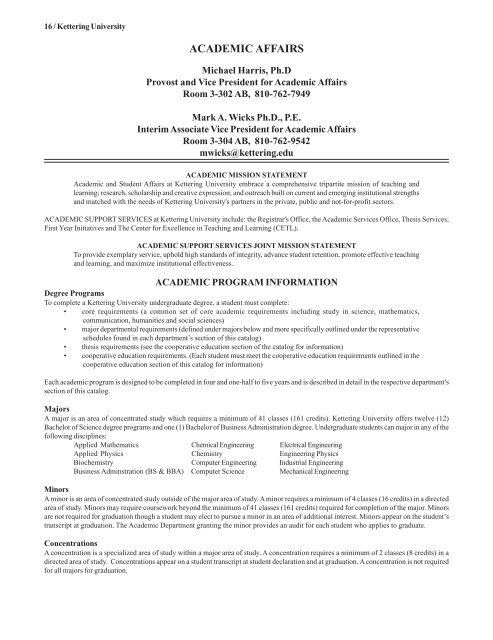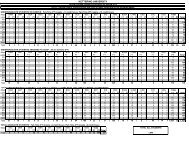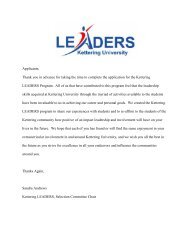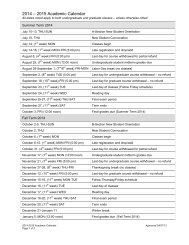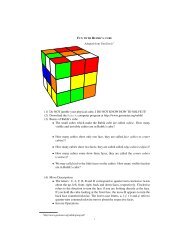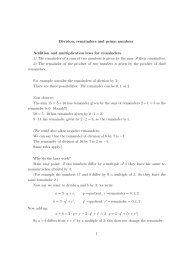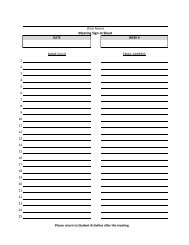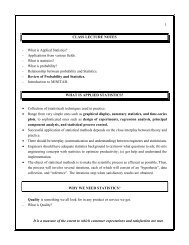2008-2009 Undergraduate Catalog - Kettering University
2008-2009 Undergraduate Catalog - Kettering University
2008-2009 Undergraduate Catalog - Kettering University
You also want an ePaper? Increase the reach of your titles
YUMPU automatically turns print PDFs into web optimized ePapers that Google loves.
16 / <strong>Kettering</strong> <strong>University</strong><br />
ACADEMIC AFFAIRS<br />
Michael Harris, Ph.D<br />
Provost and Vice President for Academic Affairs<br />
Room 3-302 AB, 810-762-7949<br />
Mark A. Wicks Ph.D., P.E.<br />
Interim Associate Vice President for Academic Affairs<br />
Room 3-304 AB, 810-762-9542<br />
mwicks@kettering.edu<br />
ACADEMIC MISSION STATEMENT<br />
Academic and Student Affairs at <strong>Kettering</strong> <strong>University</strong> embrace a comprehensive tripartite mission of teaching and<br />
learning; research, scholarship and creative expression; and outreach built on current and emerging institutional strengths<br />
and matched with the needs of <strong>Kettering</strong> <strong>University</strong>'s partners in the private, public and not-for-profit sectors.<br />
ACADEMIC SUPPORT SERVICES at <strong>Kettering</strong> <strong>University</strong> include: the Registrar's Office, the Academic Services Office, Thesis Services,<br />
First Year Initiatives and The Center for Excellence in Teaching and Learning (CETL).<br />
ACADEMIC SUPPORT SERVICES JOINT MISSION STATEMENT<br />
To provide exemplary service, uphold high standards of integrity, advance student retention, promote effective teaching<br />
and learning, and maximize institutional effectiveness.<br />
ACADEMIC PROGRAM INFORMATION<br />
Degree Programs<br />
To complete a <strong>Kettering</strong> <strong>University</strong> undergraduate degree, a student must complete:<br />
• core requirements (a common set of core academic requirements including study in science, mathematics,<br />
communication, humanities and social sciences)<br />
• major departmental requirements (defined under majors below and more specifically outlined under the representative<br />
schedules found in each department’s section of this catalog)<br />
• thesis requirements (see the cooperative education section of the catalog for information)<br />
• cooperative education requirements. (Each student must meet the cooperative education requirements outlined in the<br />
cooperative education section of this catalog for information)<br />
Each academic program is designed to be completed in four and one-half to five years and is described in detail in the respective department's<br />
section of this catalog.<br />
Majors<br />
A major is an area of concentrated study which requires a minimum of 41 classes (161 credits). <strong>Kettering</strong> <strong>University</strong> offers twelve (12)<br />
Bachelor of Science degree programs and one (1) Bachelor of Business Administration degree. <strong>Undergraduate</strong> students can major in any of the<br />
following disciplines:<br />
Applied Mathematics Chemical Engineering Electrical Engineering<br />
Applied Physics Chemistry Engineering Physics<br />
Biochemistry Computer Engineering Industrial Engineering<br />
Business Adminstration (BS & BBA) Computer Science Mechanical Engineering<br />
Minors<br />
A minor is an area of concentrated study outside of the major area of study. A minor requires a minimum of 4 classes (16 credits) in a directed<br />
area of study. Minors may require coursework beyond the minimum of 41 classes (161 credits) required for completion of the major. Minors<br />
are not required for graduation though a student may elect to pursue a minor in an area of additional interest. Minors appear on the student’s<br />
transcript at graduation. The Academic Department granting the minor provides an audit for each student who applies to graduate.<br />
Concentrations<br />
A concentration is a specialized area of study within a major area of study. A concentration requires a minimum of 2 classes (8 credits) in a<br />
directed area of study. Concentrations appear on a student transcript at student declaration and at graduation. A concentration is not required<br />
for all majors for graduation.


